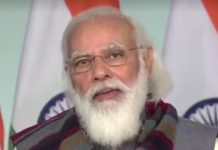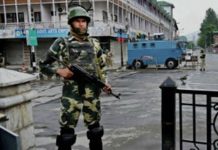 It’s now official now! The Indian economy is suffering through a major slowdown, and one that shows no immediate sign of recovering unless the present government reinvents itself. India’s economic growth has slipped further to hit an over six-year low of 4.5 per cent in July-September, according to official data released on November 29, 2019. The previous low was recorded at 4.3 per cent in the January-March period of 2012-13. During the six-month period (April-September 2019), the Indian economy grew 4.8 per cent as against 7.5 per cent in the same period a year ago. By comparison, China’s economic growth was 6 per cent in July-September 2019, which was the weakest expansion in over 27 years.
It’s now official now! The Indian economy is suffering through a major slowdown, and one that shows no immediate sign of recovering unless the present government reinvents itself. India’s economic growth has slipped further to hit an over six-year low of 4.5 per cent in July-September, according to official data released on November 29, 2019. The previous low was recorded at 4.3 per cent in the January-March period of 2012-13. During the six-month period (April-September 2019), the Indian economy grew 4.8 per cent as against 7.5 per cent in the same period a year ago. By comparison, China’s economic growth was 6 per cent in July-September 2019, which was the weakest expansion in over 27 years.
India’s July-September 2019, gross domestic product (GDP) growth rate fell to 4.5 per cent, the lowest in more than six years, compared with 7.5 per cent in the same quarter of 2018-19, government data showed. The low rate of expansion was mainly on account of a weak manufacturing, falling consumer demand and private investment, and a drop in exports due to a global slowdown. In the previous quarter (April-June 2019), the country’s economic growth had stood at a seven-year low of 5 per cent, against 8 per cent growth during the same period a year earlier.
Gross value added (GVA) growth during the second quarter stood at 4.3 per cent, against 4.9 per cent in April-June this year and 6.9 per cent in the September quarter last year. Gross fixed capital formation at current prices declined sharply to 1.02 per cent, compared with 11.8 per cent in the same quarter last year. For the first six months of the year (April-September 2019), the economic growth came to 4.8 per cent, against 7.5 per cent in the same period last year.
In another sign of pain in the economy, official data released recently showed that India’s fiscal deficit in the first seven months through October stood at 7.2 trillion, or 102.4 per cent of the budgeted target for the current financial year. Besides, the output of eight core infrastructure industries in the economy contracted by 5.8 per cent in October, indicating the severity of the economic slowdown, another set of official data showed.
In view of slowing rates of growth, the Reserve Bank of India (RBI) had earlier lowered its GDP growth projection for full 2019-20 financial year to 6.1 per cent from 6.9 per cent forecast previously. The GDP growth rate this year is the lowest quarterly rate since the 4.3 per cent clocked in January-March quarter of 2012-13 when India had been battling high inflation and political turmoil, besides global economic pressures.
While there is no particular study to know why it had happened. Experts point out that investment had dried up and it contracted a meager 3 per cent in real terms last quarter, after growing almost 12 per cent in the same quarter last year.
Has India dropped out of that group of fast-growing emerging economies? Former prime minister Manmohan Singh said the GDP growth rate of 4.5 per cent was unacceptable and worrisome, and urged his successor Prime Minister to set aside “his deep-rooted suspicion” of society and nurse India back to harmonious, mutually trustworthy society that can help the economy soar. Delivering his valedictory address at a national conclave on economy, Singh said mutual trust is the bedrock of societal transactions fostering economic growth, but “our social fabric of trust, confidence is now torn and ruptured”.
The “toxic combination of deep distrust, pervasive fear and a sense of hopelessness in our society” is stifling economic growth, he said. “The GDP figures released earlier today point the growth rate of our economy in the second quarter of the current fiscal year is as low as 4.5 per cent. This is clearly unacceptable. And, the aspirations of our people want that this country should grow at 8 to 9 per cent per annum. Therefore, the sharp decline in growth rate from 5 per cent in first quarter to 4.5 pc in second quarter is indeed worrisome.”
Singh, an eminent economist himself, said with an absolute majority in Lok Sabha and low global oil prices, the government has a once-in-a-generation economic opportunity to catapult India to the next phase of economic development and create new jobs for hundreds of millions of youth.
In a direct message to Prime Minister he said, “I urge the Prime Minister to set aside his deep-rooted suspicion of our society and nurse us back to a harmonious, confident and mutually trustworthy society that can revive the animal spirits and help our economy soar.”
He said that a nation’s state of the economy is also a reflection of the state of its society. “An economy is a function of the numerous exchanges and social interactions among the people and institutions.
Mutual trust and self-confidence are the bedrock of societal transactions that fosters economic growth. Our social fabric of trust and confidence is now torn and ruptured,” he noted.
“There is a palpable climate of fear in our society today. Many industrialists tell me they live in fear of harassment by government authorities. Bankers are reluctant to make new loans, for fear of retribution. Entrepreneurs are hesitant to put up fresh projects, for fear of failure attributed to ulterior motives. Policy makers in government and other institutions are scared to speak the truth or engage in intellectually honest policy discussions. There is profound fear and distrust among our various economic participants. Public trust in independent institutions such as the media, judiciary, regulatory authorities, and investigative agencies has been severely eroded. This toxic combination of deep distrust, pervasive fear and a sense of hopelessness in our society is stifling economic activity and hence economic growth,” he said.
Singh said root cause of this is the government’s policy doctrine that seems to suspect every industrialist, banker, policy maker, regulator, entrepreneur and citizen, which has halted economic development with bankers unable to lend, industrialists unable to invest and policymakers unable to act. The “government seems to view everything and everyone through a tainted prism of suspicion and distrust through which every policy of previous governments was considered of bad intent, every loan sanctioned was undeserving, every new industrial project was crony in nature and so on”.
For economic growth to revive, it is very important that the government enthuses trust and confidence. It is very important for businessmen, capital providers and workers to feel confident and exuberant rather than being fearful and nervous. This is possible only if the government sheds its current doctrine and begins to trust India’s farmers, India’s entrepreneurs and India’s citizens at large.
The former PM observed “There is no one today that can deny the sharp slowdown in India’s economy and its disastrous consequences, particularly for farmers, youth and the poor. But it is my belief that mere changes in economic policy alone will not help revive the economy. We need to change the current climate in our society from one of fear to one of confidence for our economy to start growing robustly again.”
He noted that India is now a USD-3 trillion global economic powerhouse driven largely by private enterprise and it is not a tiny command and control economy that can be bullied and directed at will.
letters@tehelka.com












